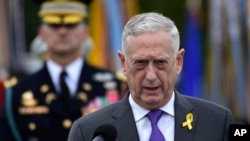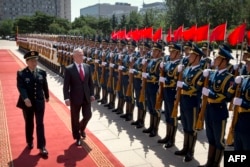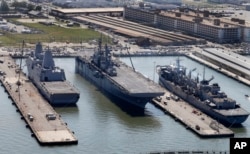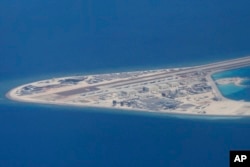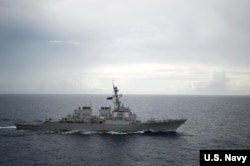The Pentagon has canceled plans for U.S. Defense Secretary Jim Mattis to visit China after his counterpart in Beijing could not be made available, a U.S. defense official told VOA on Monday.
The trip was never finalized or formally announced. The Pentagon decided not to participate late last week after trying to schedule security talks with General Wei Fenghe, the defense official said.
Trip plans for cabinet officials do fall through from time to time and are usually unreported.
The trip cancellation comes after China last week recalled its naval chief, Vice Admiral Shen Jinlong, from a planned meeting in Newport, Rhode Island, and denied a Hong Kong port visit request from the USS Wasp warship.
It also comes as the U.S. military has conducted several freedom of navigation operations in the South China Sea. The United States frequently conducts freedom of navigation operations in the South China Sea to dispute China's claims and to promote free passage through international waters that carry half the world's merchant fleet tonnage, worth trillions of dollars each year.
On Sunday, a Chinese military ship came “dangerously close” to a U.S. destroyer ship as it conducted a freedom of navigation operation in international waters within 12 nautical miles (22km) of the Spratly Islands, a defense official told VOA.
"At approximately 0830 local time on Sept. 30, a PRC Luyang destroyer approached USS Decatur in an unsafe and unprofessional maneuver in the vicinity of Gaven Reef in the South China Sea,” Navy Cmdr. Nate Christensen, the deputy spokesman for U.S. Pacific Fleet, told VOA.
Christensen added that the Chinese military ship carried out “increasingly aggressive maneuvers” and sailed within about 40 meters of USS Decatur's bow, causing the ship to maneuver in order to prevent a collision.
U.S. Air Force B-52 bombers also conducted transit operations in international airspace over the South China Sea and East China Sea last week, which the Pentagon called part of “continuous bomber presence” in the region, and China called “provocative.”
Secretary Mattis met with his counterpart in Beijing in June, along with Chinese President Xi Jinping.
Since then, China and the U.S. have been engaged in a trade war, with Washington last week placing tariffs on another $200 billion of Chinese imports.
Tensions are also high over U.S. President Donald Trump’s authorization of a $1.3 billion arms sale to Taiwan, which Beijing considers a renegade province, and Trump’s sanctions for Beijing’s recent purchase of Russian military equipment.




